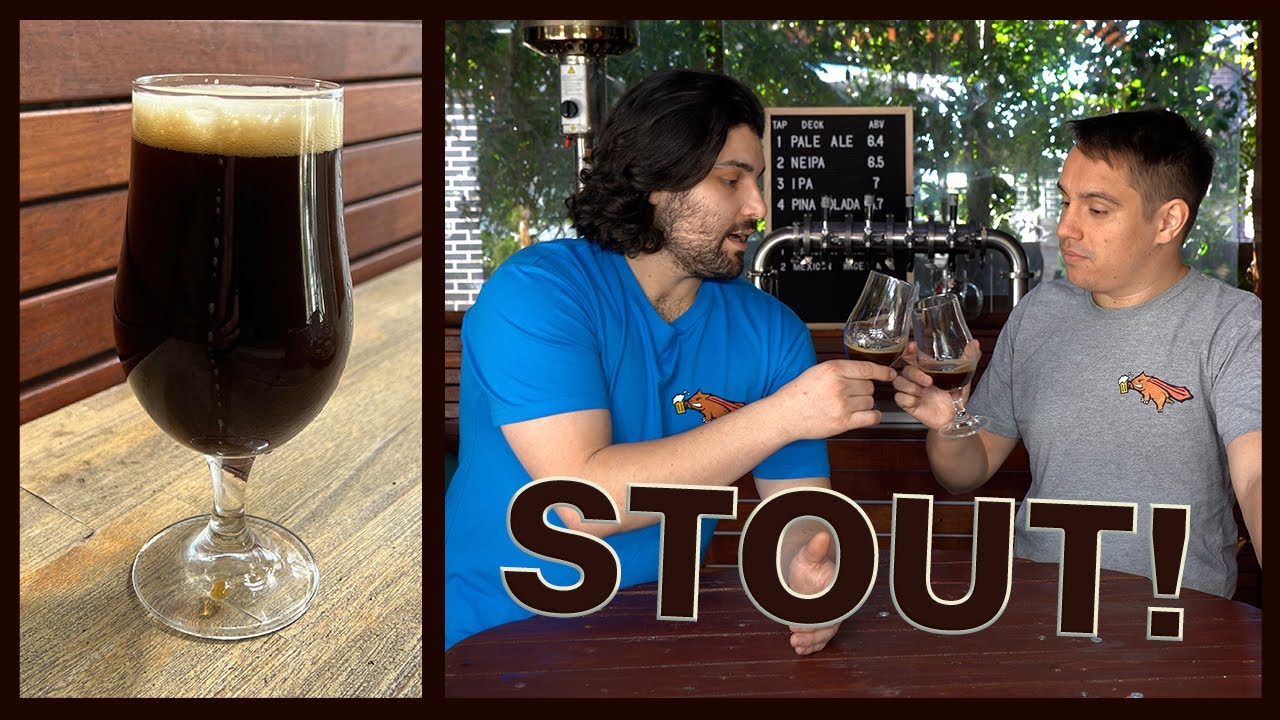Chocolate Stout with real cacao nibs

So... What is it?
The Chocolate stout is a rich beer that combines the robustness of stout with luscious chocolate. Its roots date back to the 18th century, gaining popularity in England. This decadent brew features a velvety texture, dark color, and a delightful aroma blending roasted malt notes with hints of cocoa and espresso. The flavor offers a harmonious mix of bittersweet chocolate, roasted malts, and subtle caramel undertones, creating a satisfying complexity for beer enthusiasts seeking a luxurious treat.
What's ours like?
Ours is packed full of chocolate like you wouldn't believe! on the nose its all dark choc and fresh baked dark bread. The palate its far less bitter and astringent than what you would usually get in a stout that uses heavily roasted malts and leans more into dark chocolate rather than espresso or cold drip coffee. Coming in at a moderate 5.7% its easy drinking for a dark beer, but if we couldve changed a couple thing with this brewday we would add more chocolate malt, Oats and increase the mash temp to 69°C (156°F) to give a little more body and mouthfeel!
Batch Size & Stats
- 38L (2 19L corny kegs) / 10 gal finished beer
- 49L (13.2 gal) wort
- For a smaller 19L (5 gal) batch size simply half the ingredients of this recipe
- Starting gravity – 1.066
- Final gravity 1.015
- ABV – 5.7% (before rum addition) – 7.2% (after rum addition)
- You can use this website to calculate final ABV after rum addition Vinocalc
What ingredients?
Water
With sparging
- 30L (7.9 gal) strike water for a 67°C (152°F) 60 min mash (you can use our calculator to measure ideal temp for strike)
- 30L (7.9 gal) sparge water at 78°C (172°F)
Without sparging
- 57L (15 gal) strike water for a 67°C (152°F) 60 min mash (you can use our calculator to measure ideal temp for strike)
Post brew edits / potential changes thoughts: perhaps mash at 69°C (156°F) to give more body
Malts:
- Light Munich – 8.625kg (19 lb)
- Big O (oat malt) – 1.575kg (3.47 lb)
- Golden Naked Oats – 840g (1.85 lb)
- Medium Crystal Malt – 480g (1.05 lb)
- Dark Chocolate – 480g (1.05 lb)
Post brew edits / potential changes thoughts: for more body and darker colour
- increase dark chocolate to 624g (1.38 lb)
- add wheat malt 840g (1.85 lb)
Hops & whirlfloc tablets
Northern Brewer
- 20g (0.7 oz) - 60 minutes left in the boil
- 50g (1.76 oz) 15 minutes left in the boil
Fuggles
- 50g (1.76 oz) 15 minutes left in the boil
Whirlfloc tablets
- 1.5g (0.052 oz) / 2 tablets – 15 minutes left in the boil
Adjuncts
Cocoa Nibs (lightly crushed with either mortar & pestle or food processor and toasted at 180°C (356°F) for 5 mins
- 500g (1.1 lb) – 5 minutes left in the boil
- 500g (1.1 lb) – soaked in 700ml of rum for at least a week – “dry hop” fermenter when fermentation is close to finished (e.g. 1.020) around day 7-10
Yeast options & fermentation temperatures
- US-05 – ferment at 20°C (68°F) 23g (0.81 oz) / (2 packets)
- AUS-05 – ferment at 20°C (68°F) 23g (0.81 oz) / (2 packets)
- S-04 – ferment at 18°C (64.4°F) 22g (0.81 oz) / (2 packets)

Step by step process
Step 1 – Milling
- Mill grains to medium crush (set mill rollers to a gap of approx. 1.00mm / 0.039 inches)
- Just keep in mind roller gap settings are not universal so as you brew more batches you will find the ideal crush size for your setup
- Alternatively if you don’t have a grain mill you can order your grains crushed from most homebrew stores, both online and in person
Step 2 – Mashing
- Mash for 60 minutes at 67°C (152°F)
- Set your strike water to a few degrees above the target mash temperature, you can use our calculator to determine what your strike temperature should be
- ensure you mix in the grains thoroughly with a mash paddle to prevent dough balls from forming (big spoons, spatulas or whisks will also work)
- its easier to mash the grains and prevent dough balls if you add a little grain at a time, mix, add more grain and repeat until all the grains are mixed
- if you don’t have a mash tun with heating then ensure after you have finished mixing the grains in to insulate your mash tun (thick neoprene or heavy blankets both work well)
Step 3 (optional) – Sparging
- if your setup has the capability to sparge then do so with 30L (7.9 gal) sparge water at 78°C (172°F)
- if you are not sparging and using a BIAB (brew in a bag) method then remove grains from mash tun and twist and squeeze the bag to get as much liquid out of the grains as possible
- as you start sparging (or straining your BIAB bag) begin raising the temperature of your wort to a boil
Step 4 – Boiling
- once your wort begins to boil start a timer for a 60-minute boil and add your bittering hops, 20g (0.7 oz) of Northern Brewer
- at 15 minutes left in the boil add 2.5 whirlfloc tablets & remaining hops, 50g (1.76 oz) each of Northern Brewer & Fuggles
Step 5 – Whirlpooling / cooling
- once wort has been boiling for 60 minutes in total turn off your heat source and begin chilling wort down to yeast pitching temperature
- once you’ve reached yeast pitching temperature take an original gravity reading of your wort
Step 6 – Yeast Pitching
- It is best to make a yeast starter before beginning your brew day (ideally 1 day before) to ensure your yeast are as active and healthy as possible before pitching, but not completely necessary – you could also just rehydrate yeast 30 minutes before pitching.
- Pitch yeast in wort a degree or two higher than the target fermentation temperature to help yeast take off more aggressively
- To make a yeast starter you can use either:
- DME (dry malt extract) at a ratio of approx. 100g per 1L water (3.5 oz per 33 fluid ounces) for gravity of approx. 1.040
- some unfermented wort kept cold and sanitary from a previous brew day
- 70g of table sugar per 1L water (2.5 oz per 33 fluid ounces) – however, it is best to use malt sugar (wort / DME) whenever possible to reduce the chance of shocking the yeast with a different food source from starter to wort pitching
- To rehydrate yeast
- Add yeast to approx. 10 times as much room temperature water as the weight of the yeast e.g. 10g yeast in 100 ml water (0.35 oz yeast in 3.5 fluid ounces water)
Step 7 – Fermentation
- Allow yeast to ferment over the next week to two weeks
- If you have a temperature-controlled system keep the fermenter temperature to the recommended fermentation temperature for each yeast strain (stated in the yeast ingredients section above)
- Monitor the fermentation activity over the first 7 days by the bubbling of the blow off tube / airlock of your fermenter, as the bubbling slows down (roughly around day 7) take a gravity reading. If its around 1.020 – 1.025 “dry hop” with rum soaked cocoa nibs
- When the gravity reaches around 1.018 raise the temperature of your fermenter by 1-2 degrees for 2 days for a diacetyl rest (if you don’t have temperature control don’t worry about this step, its not the end of the world!)
- Its important to note that fermentation times will vary based on your circumstances like, temperature, amount of yeast pitched, healthiness of yeast, gravity of wort, pH etc. so don’t stress be patient and know that these times are just a rough guide
- Two days after dry hopping take a gravity reading, fermentation should finish at about 1.015, if you haven’t reached this yet wait another day and take another reading, once the gravity is the same 2 days in a row move onto cold crashing! (If you can’t / don’t want to cold crash go straight to kegging/bottling your beer!)
Step 8 (optional) – Cold crashing
- begin cold crashing your fermenter (bring the temperature of your fermenter down to as close to 0°C (32°F) as possible, for 2 days to a week depending on how patient you are
- If you don’t have a temp-controlled fermenter, you can cold crash by putting your fermenter in a fridge or temp-controlled chest freezer
- After you have finished cold crashing it's time to keg/bottle your beer! If you are bottling your beer from the fermenter uncarbonated remember to add about 5-7 grams (0.17 - 0.24 oz) of priming sugar to your bottles to carbonate your beer.


